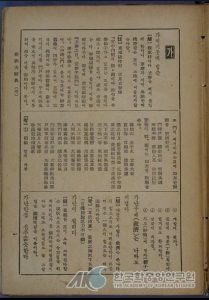 Proverbs are characterized as concrete and traditional sayings that emerged from common sense or a shared understanding of something. Proverbs exist in most if not all languages for the ease of expression and are transmitted from culture to culture. Korean proverbs are, in some ways, like English proverbs, or even the same in terms of literal meaning. But proverbs designed for a particular culture will not make sense or apply to another.
Proverbs are characterized as concrete and traditional sayings that emerged from common sense or a shared understanding of something. Proverbs exist in most if not all languages for the ease of expression and are transmitted from culture to culture. Korean proverbs are, in some ways, like English proverbs, or even the same in terms of literal meaning. But proverbs designed for a particular culture will not make sense or apply to another.
Often, the origin of proverbs is ambiguous as they are passed down by individuals for prolonged periods of time. Many have come from stories, poetry, film, and songs. However, Korean proverbs could have originated from any single individual and be imitated and passed down.
Korean proverbs are presented in a sophisticated manner and reveal profound knowledge and history. Because many proverbs are poetic and meaningful, being able to use them implies great wisdom and adept cultural understanding. Some widely used Korean proverbs include ”No news is good news” (무소식이 희소식) and ”Blood is thicker than water” (피는 물보다 진하다). The structure of Korean proverbs is commonly characterized by declarative statements “Necessity is the mother of invention” (궁하면 통한다), rhetorical question “There is no smoke without fire” (아니 땐 굴뚝에 연기날까), or imperative phrases “Look before you leap” (돌다리도 두드려 보고 건너라).
In addition, Korean proverbs can be complex and difficult to interpret without context. Metaphorical proverbs like ”Blood is thicker than water” (피는 물보다 진하다) are easier to understand and resonate with due to its universality, but ones like ”a thief who wears a noble’s hat” (사모 쓴 도둑놈) are more difficult to decipher. This is because proverbs reflect cultural values and societal character of a particular people, and older proverbs criticizing government officials were typical because of their imposed oppression on the commoners. Korean proverbs are also characterized by themes such as mammonism and utilitarianism, anti-Buddhism, and male chauvinism. These proverbs existed in Korean society before contemporary times, where many commoners suffered from social anxiety, oppression by the government, male dominance, and poverty.
Korean proverbs can be difficult to understand without the appropriate context or cultural knowledge, which is they are an embodiment of wisdom and craft. It is notable that proverbs may be unique to a culture and do not represent universal truths.
Written by: Yini Lin.
From Hawaii, United States. University of Hawai’i at Mānoa Class of 2021. B.A. Candidate in Korean Language Flagship. B.A. Candidate in Asian Studies. Exchange student at Korea University. Intern at VANK (Voluntary Agency Network of Korea)